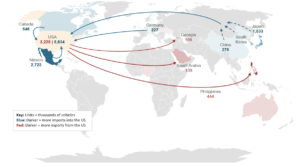
US tariffs on vehicles were unlikely to disturb platinum group metals (PGMs) demand, said the World Platinum Investment Council (WPIC).
It calculated a 70,000 ounce impact on platinum automotive demand and a 269,000 oz impact on palladium in vehicles. This is assuming a 25% tariff, contemplated by the US President Donald Trump, is implemented on April 3.
Adding a possible reduction in recycling supply from scrapped vehicles – more likely with tariffs as they will translate into car price inflation – the net impact on automotive demand for the metals could be even lower, the council said.
The authors of the WPIC’s report, led by head of research Edward Sterck, described the relatively low impact of tariffs on PGMs “surprising”.
The council flagged other future developments as having more impact on metal prices including the possible deterioration of relationships between the US and South Africa. The US government recently expelled South Africa’s ambassador.
It added that concerns tariffs could extend to metal imports might also lead to a rush for metal deliveries by car manufacturers in the US. This would lead to a market distortion (pushing up prices), the council said.
US president Donald Trump is set to implement wide-ranging tariffs with all trading partners from April 2. Dubbed ‘Independence Day’, the tariffs are intended to narrow or remove US trade deficits in certain goods. The trade deficit associated with the automotive sector was about $300bn in 2024, a significant part of the $1,000bn national deficit.
[Click image to enlarge]

Source: WPIC
Longer term, the US administration is hoping that unaffordable imports of foreign vehicles will force automakers to build cars locally and restore the US’s manufacturing base. But the council said this would take “a long time”. Tariffs would also increase costs that will also in some form be passed onto the consumer, negatively impacting demand, the council said.
The US is the second largest automotive market globally and is served by an international supply chain. The US imported 8.6 million vehicles in 2023, while $92bn of component imports support domestic production of 10.5 million vehicles, including commercial units.










